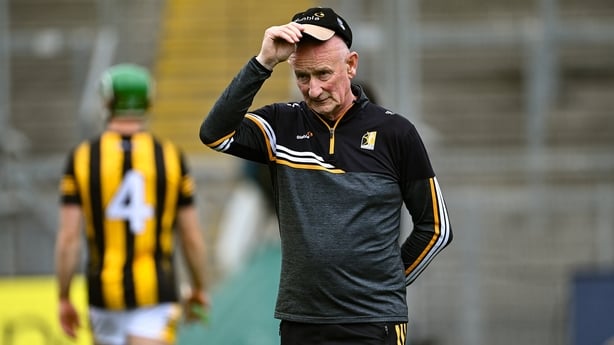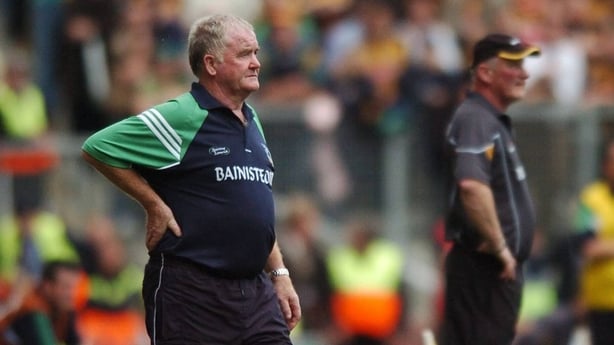Limerick and Kilkenny meet in a decider for the first time in 15 years, having essentially flipped roles in the meantime.
In 2007, Kilkenny were the oppressively dominant force. Limerick, unfancied at the beginning of the year, were the challengers to emerge from the pack.
Back then, there was little doubt where neutrals stood. Limerick were the romantic outsiders, with a sorry history of trauma on All-Ireland final day, from which they've only recently recovered.
The year of 1994 couldn't be referenced without a grimace. During injury-time in the 2018 All-Ireland final, the old fatalism rushed to the surface again - "It's over lads, it's over, it's a point," announced one Limerick fan in the Davin End, bracing himself for the inevitable disappointment as Joe Canning's free hung in the air - before being banished forever at the final whistle.
Our qualitative research into the matter indicates that neutrals are currently torn on who to follow this weekend.
The idea of Kilkenny as heart-warming underdogs will probably take more than a seven-year 'famine' at All-Ireland level to properly settle in people's heads.
Many neutrals, conditioned to believe that one or other of the Big Three will rise to the top again before long, are still rooting for the favourites and three-in-a-row chasers, accepting that Limerick should be making hay for as long as the sun does shine.
However, others have already tired of Limerick's reign and are embracing the unthinkable, backing Kilkenny as part of a change agenda.

Brian Cody's side may also attract outside support on the basis of the developing - and increasingly tetchy - provincial rivalry within hurling. The Leinster hurling fraternity long ago grew weary and resentful at the hype and the high-flown rhetoric that surrounds the Munster hurling championship, hence the palpable glee in some quarters at the semi-final blowout against Clare.
The not-insignificant miserable grouch constituency, whose main concern is that their heads not be wrecked, are also instinctively sympathetic to Cody's men. The famous lament of 'we'll never hear the end of it...' does not apply to Kilkenny. Historically, when Kilkenny won the All-Ireland, you did hear the end of it, and usually quite soon afterwards.
There are considerable parallels between the Limerick team of today and the Kilkenny class of 2007, particularly in the narrative surrounding them, both good and bad.
Both were hailed in real-time as being amongst the greatest sides ever to play the game, with barely any weaknesses in their arsenal. Both were subject to regular comparison with the great teams of the past.
And they both, at their zenith, provoked a degree of despair in their rivals, who struggled to comprehend how they could possibly be beaten.
There were certain points of difference. The late noughties were a more innocent, anarchic era in hurling. Kilkenny ruled the sport via macho dominance of the skies, a rabid physicality and an efficient ruthlessness in front of goal. They were simply the fastest draw around. Limerick have many of the same spectacular natural assets - but their dominance also feels more surgical and plotted.
Whereas Cody was at pains to insist there was no secret sauce or tactical jiggery-pokery accounting for Kilkenny's success, Limerick's embrace of the tactical element is plain to see, most especially in the pandemic when they made shameless use of a tactics board during the water-breaks. (Indeed, it was the sight of Kinnerk gesticulating beside the mobile white-board that probably did for the water-breaks in the end).
2007 was the year when the commentariat really began to fasten onto Kilkenny's tackling and the phrase 'playing on the edge' entered the great book of hurling euphemism.
Soon, the phrase would become so ubiquitous that it even reached the lips of Ryan Tubridy, who broached the topic with Brian Cody in a Late Late Show interview two years later.
"I hope so," was Cody's clever response when asked whether KK played on the edge, "the edge is the place to play."
It was Ger Loughnane who fired the starter pistol in that discussion when he asserted that Kilkenny were deliberately pulling across opponents' arms and wrists in advance of that year's quarter-final against his Galway team.
Cody kept his counsel until after the All-Ireland final when he sounded off on national radio about "a lunatic from Clare taking rubbish at the moment."
Limerick are regularly assailed by similar criticisms these days. Their disciplinary issues finally became the subject of widespread conversation in the 2021 league.
It was Donal Óg Cusack who read out their litany of transgressions after Gearóid Hegarty was sent off for striking out with the hurley in a brawl against Galway in the Gaelic Grounds last February.
"Listen, Limerick have been outstanding champions for the last few years but if there's been one question mark around them, a main question mark, it's around their discipline," Cusack said on RTÉ's coverage.
"Flanagan got sent off against Waterford last year. Gillane and Flanagan should have got sent off in the Munster final. Casey was sent off and Hegarty tonight. And it was right that he got sent off. And I would say this as well, with Hegarty, you'd have to say, it's coming to him with a while. You'd have to say, it wouldn't take you that long to find five other instances..."
It was telling in the aftermath that Kilkenny pundits tended to be instinctively defensive of the Limerick players in this regard, likely recalling their own time (the innate Kilkenny hostility to Cork pundits may also mixed up in this).
Richie Power had a lash out at Donal Óg's contribution, remarking that Hegarty "plays the game on the edge and crosses that edge but that's what makes him so good" - an almost parodically Kilkenny-esque opinion on the sport.
Despite their formidable underage pedigree, Limerick's appearance in the 2007 final was a bolt from the blue. Before the season began, they hadn't even won a championship match against top-tier opposition since 2001 - the summer when Eamonn Cregan took aim at the 'Cork Examiner'.

In '07, under the colourful management of '73 stalwart Richie Bennis, they toppled Tipperary after a three-game saga, building sufficient moment to overcome Clare in a quarter-final and avenge their Munster final loss to Waterford in a quite surreal All-Ireland semi-final.
The final loss is occasionally lumped in with the Kilkenny-Waterford '08 as a one-sided decider from that era - in actual fact, this is unfair. After a horror start, Limerick were resilient enough to keep the scoreline respectable - 2-19 to 1-15 - though they never looked like winning.
After '07, Limerick swiftly returned from whence they came, ie, nowhere. The following year, they were eliminated from the championship by Offaly.
Here's where the parallel with Kilkenny ends. While KK's early league performances were derided and there were mutterings of growing dissatisfaction with the ancient regime at the beginning of the year, there is little prospect of Kilkenny entering the wilderness should they fall short on Sunday.
Whatever happens, Brian Cody has likely already quietened his critics for another while yet. At the weekend, he has the chance to both topple the Limerick empire and win possibly the greatest All-Ireland of his long reign.
Follow the All-Ireland Hurling Championship final on Sunday, Limerick v Kilkenny, from 2pm via our live blogs on rte.ie/sport or on the RTÉ News app. Watch live coverage on RTÉ One and RTÉ Player with live radio commentary on RTÉ Radio 1
We need your consent to load this rte-player contentWe use rte-player to manage extra content that can set cookies on your device and collect data about your activity. Please review their details and accept them to load the content.Manage Preferences
Listen to the RTÉ GAA Podcast at Apple Podcasts, Soundcloud, Spotify, or wherever you get your podcasts.


